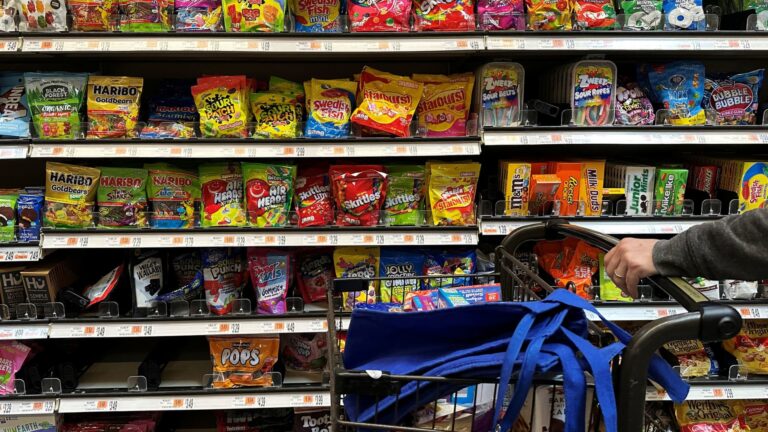Candy is displayed for sale, as U.S. Health and Human Services (HHS) Secretary Robert F. Kennedy, Jr., along with FDA Commissioner Marty Makary, announce the FDA’s intent to remove from the U.S. food supply “petroleum-based synthetic” food dyes, which are present in numerous foods such as breakfast cereals, candy, snacks, and beverages, at a grocery store in Medford, Massachusetts, U.S., April 22, 2025.
Brian Snyder | Reuters
The fluorescent red of Flamin’ Hot Cheetos, the brilliant teal of Mountain Dew Baja Blast and the colorful rainbow of Skittles may soon be dimmed.
The Food and Drug Administration is phasing out the use of petroleum-based synthetic dyes by the end of next year, the agency announced on Tuesday.
“For the last 50 years, American children have increasingly been living in a toxic soup of synthetic chemicals,” FDA Commissioner Marty Makary said at a press conference.
Food and beverage companies use additives like red dye 40 to give cereal, chips, sports drinks and other products bright hues that attract shoppers. But backlash against artificial colorants has been brewing in the U.S. for more than a decade.
The changes will affect a slew of food giants, including PepsiCo, General Mills, Mars and WK Kellogg. The industry has argued that the claims about the dangers of artificial dyes lack evidence that would support any bans.
As of Tuesday, the FDA and the food industry don’t have a formal agreement to remove artificial dyes but instead “an understanding,” according to Health Secretary Robert F. Kennedy Jr. It is unclear what enforcement actions the agency would take if food and beverage companies do not comply.
“There are a number of tools at our disposal,” Makary said. “I believe in love, let’s start in a friendly way and see if we can do this without any statutory or regulatory changes, but we are exploring every tool in the toolbox to make sure this gets done very quickly. And they want to do it — so why go down a complicated road with Congress?”
The FDA is taking several actions, including setting a “national standard” and timeline for the food industry to transition from petroleum-based food dyes to natural alternatives, according to Makary. The agency is also initiating a process to revoke authorization of synthetic food colorings, including those not in production, within the coming weeks.
He added that the FDA is also eliminating the remaining six synthetic dyes on the market from the U.S. food supply by the end of the year, specifically red dye 40, yellow dye 5, yellow dye 6, blue dye 1, blue dye 2 and green dye 2. It is also requesting food companies to phase out red dye 3 by the end of next year, which is sooner than the 2027 to 2028 deadline previously announced, according to Makary.
“For companies that are currently using petroleum based red dye, try watermelon juice or beet juice. For companies currently combining petroleum-based yellow chemical and red dyes together, try carrot juice,” he said.
U.S. Food and Drug Administration (FDA) Commissioner Marty Makary holds up a study from The Lancet during an announcement of the FDA’s intent to phase out the use of petroleum-based synthetic dyes in the nation’s food supply during a press conference at the Department of Health and Human Services in Washington, D.C., U.S., April 22, 2025. REUTERS/Elizabeth Frantz
Elizabeth Frantz | Reuters
Makary added that the agency plans to authorize four additional color additives using natural ingredients in the coming weeks, while also expediting the review and approval of other natural ingredient colors.
Makary cited a Lancet study that concluded that artificial colors in the diet “result in increased hyperactivity.”
“The F in FDA stands for food,” he said. “Now, there’s no one ingredient that accounts for the child chronic disease epidemic. And let’s be honest, taking petroleum-based food dyes out of the food supply is not a silver bullet that will instantly make America’s children healthy, but it is one important step.”
Last month, Kennedy told top food executives that removing artificial dyes from the food system is an urgent priority of the Trump administration. Meeting attendees included the CEOs of PepsiCo North America, Kraft Heinz, General Mills, Tyson Foods, WK Kellogg, J.M. Smucker and the Consumer Brands Association, the industry’s top trade group.
Kennedy has used Kellogg’s Froot Loops as his primary example when railing against artificial colorants.
While it is unclear exactly how removing dyes could affect the companies’ businesses, it will be a major effort to overhaul recipes — and the new looks could affect how consumers perceive the products.
Makary said phasing out petroleum-based food dyes won’t increase food prices, pointing to other countries that have made similar moves. However, synthetic dyes are generally more cost-effective than natural alternatives, which often require larger quantities to achieve vibrant colors and can carry higher production costs, according to some reports and one natural ingredient manufacturer.
Previously, pushback from consumer advocates led some of the companies to tweak their formulas and drop artificial dyes without any government intervention. In 2015, Kraft Heinz changed the recipe of its trademark mac and cheese to use the same natural colors found in the European version of the product.
But the changes don’t always stick. In 2017, General Mills reversed course, putting its artificially colored Trix cereal back on shelves. The naturally dyed cereal, which used turmeric, radishes and purple carrots, was not as vibrant, and customers rejected the new version.
Kennedy is at the helm of a $1.7 trillion agency that oversees food and tobacco products, vaccines and other medicines, scientific research, public health infrastructure and government-funded health care. After just two months on the job, he has drastically changed the nation’s federal health agencies.
U.S. Health and Human Services (HHS) Secretary Robert F. Kennedy, Jr. leaves the stage after discussing the findings of the Centers for Disease Control and Prevention’s (CDC) latest Autism and Developmental Disabilities Monitoring (ADDM) Network survey, at the Department of Health and Human Services in Washington, D.C., U.S., April 16, 2025.
Elizabeth Frantz | Reuters
In March, he announced plans to slash 10,000 full-time employees across different departments and consolidate divisions. He has cut back crucial parts of HHS, including offices that handle HIV prevention efforts and work to eliminate health-care disparities. The Food and Drug Administration is also suspending a quality control program for testing fluid milk and other dairy products due to reduced capacity in its food safety and nutrition division, Reuters reported on Tuesday.
Kennedy’s so-called Make America Healthy Again platform argues a corrupt alliance of drug and food companies and the federal health agencies that regulate them are making Americans less healthy. He has pledged to end the chronic disease epidemic in children and adults, and has been vocal about making nutritious food, rather than drugs, central to that goal.
In January, before President Donald Trump or Kennedy took office, the Food and Drug Administration revoked its authorization of one type of red food dye called Red No. 3. The dye is known to cause cancer in laboratory animals, but food manufacturers were allowed to use it for years because scientists didn’t believe it raised the risk of cancer in humans at the level it is typically consumed.
At least one company is benefitting from the ban on artificial dyes: McCormick, which helps companies tweak their flavors and formulas.
“Now, reformulation activity has always been a part of the work that we do with our customer base, and we’ve been doing that for quite some time, but we are seeing a tick up in reformulation activity,” McCormick CEO Brendan Foley told analysts on the company’s earnings call in late March, adding that companies are seeking help cutting both artificial colors and sodium from their products.



3 Comments
Awesome https://shorturl.at/2breu
Awesome https://lc.cx/xjXBQT
Very good https://lc.cx/xjXBQT